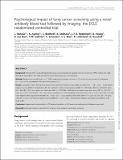Files in this item
Psychological impact of lung cancer screening using a novel antibody blood test followed by imaging : the ECLS randomized controlled trial
Item metadata
| dc.contributor.author | Hancox, J | |
| dc.contributor.author | Ayling, K | |
| dc.contributor.author | Bedford, L | |
| dc.contributor.author | Vedhara, K | |
| dc.contributor.author | Roberston, J F R | |
| dc.contributor.author | Young, B | |
| dc.contributor.author | das Nair, R | |
| dc.contributor.author | Sullivan, F M | |
| dc.contributor.author | Schembri, S | |
| dc.contributor.author | Mair, F S | |
| dc.contributor.author | Littleford, R | |
| dc.contributor.author | Kendrick, D | |
| dc.date.accessioned | 2022-03-25T12:34:58Z | |
| dc.date.available | 2022-03-25T12:34:58Z | |
| dc.date.issued | 2022-03-14 | |
| dc.identifier | 278372839 | |
| dc.identifier | fb6575fe-99ac-4c6b-8fe0-874f78c3a715 | |
| dc.identifier | 35285902 | |
| dc.identifier | 000768468000001 | |
| dc.identifier | 85153598596 | |
| dc.identifier.citation | Hancox , J , Ayling , K , Bedford , L , Vedhara , K , Roberston , J F R , Young , B , das Nair , R , Sullivan , F M , Schembri , S , Mair , F S , Littleford , R & Kendrick , D 2022 , ' Psychological impact of lung cancer screening using a novel antibody blood test followed by imaging : the ECLS randomized controlled trial ' , Journal of Public Health . https://doi.org/10.1093/pubmed/fdac032 | en |
| dc.identifier.issn | 1741-3842 | |
| dc.identifier.other | ORCID: /0000-0002-6623-4964/work/110423320 | |
| dc.identifier.uri | https://hdl.handle.net/10023/25108 | |
| dc.description | This work was supported by the Scottish Government and Oncimmune Ltd. Follow-up data collection for psychological outcome measures was supported by Oncimmune Ltd. | en |
| dc.description.abstract | Background: The Early CDT®-Lung antibody blood test plus serial computed tomography scans for test-positives (TPGs) reduces late-stage lung cancer presentation. This study assessed the psychological outcomes of this approach. Methods: Randomized controlled trial (n = 12 208) comparing psychological outcomes 1-12 months post-recruitment in a subsample (n = 1032) of TPG, test-negative (TNG) and control groups (CG). Results: Compared to TNG, TPG had lower positive affect (difference between means (DBM), 3 months (3m: -1.49 (-2.65, - 0.33)), greater impact of worries (DBM 1m: 0.26 (0.05, 0.47); 3m: 0.28 (0.07, 0.50)), screening distress (DBM 1m: 3.59 (2.28, 4.90); 3m: 2.29 (0.97, 3.61); 6m: 1.94 (0.61, 3.27)), worry about tests (odds ratio (OR) 1m: 5.79 (2.66, 12.63) and more frequent lung cancer worry (OR 1m: 2.52 (1.31, 4.83); 3m: 2.43 (1.26, 4.68); 6m: 2.87 (1.48, 5.60)). Compared to CG, TPG had greater worry about tests (OR 1m: 3.40 (1.69, 6.84)). TNG had lower negative affect (log-transformed DBM 3m: -0.08 (-0.13, -0.02)), higher positive affect (DBM 1m: 1.52 (0.43, 2.61); 3m: 1.43 (0.33, 2.53); 6m: 1.27 (0.17, 2.37)), less impact of worries (DBM 3m: -0.27 (-0.48, -0.07)) and less-frequent lung cancer worry (OR 3m: 0.49 (0.26, 0.92)). Conclusions: Negative psychological effects in TPG and positive effects in TNG were short-lived and most differences were small. | |
| dc.format.extent | 10 | |
| dc.format.extent | 307408 | |
| dc.language.iso | eng | |
| dc.relation.ispartof | Journal of Public Health | en |
| dc.subject | Behavioural medicine | en |
| dc.subject | Early detection of cancer | en |
| dc.subject | Lung neoplasms | en |
| dc.subject | Psychology | en |
| dc.subject | Screening | en |
| dc.subject | RC0254 Neoplasms. Tumors. Oncology (including Cancer) | en |
| dc.subject | 3rd-NDAS | en |
| dc.subject | SDG 3 - Good Health and Well-being | en |
| dc.subject.lcc | RC0254 | en |
| dc.title | Psychological impact of lung cancer screening using a novel antibody blood test followed by imaging : the ECLS randomized controlled trial | en |
| dc.type | Journal article | en |
| dc.contributor.institution | University of St Andrews. School of Medicine | en |
| dc.contributor.institution | University of St Andrews. Sir James Mackenzie Institute for Early Diagnosis | en |
| dc.contributor.institution | University of St Andrews. Population and Behavioural Science Division | en |
| dc.identifier.doi | https://doi.org/10.1093/pubmed/fdac032 | |
| dc.description.status | Peer reviewed | en |
This item appears in the following Collection(s)
Items in the St Andrews Research Repository are protected by copyright, with all rights reserved, unless otherwise indicated.

